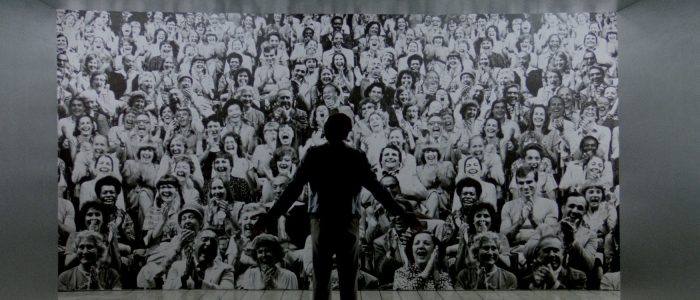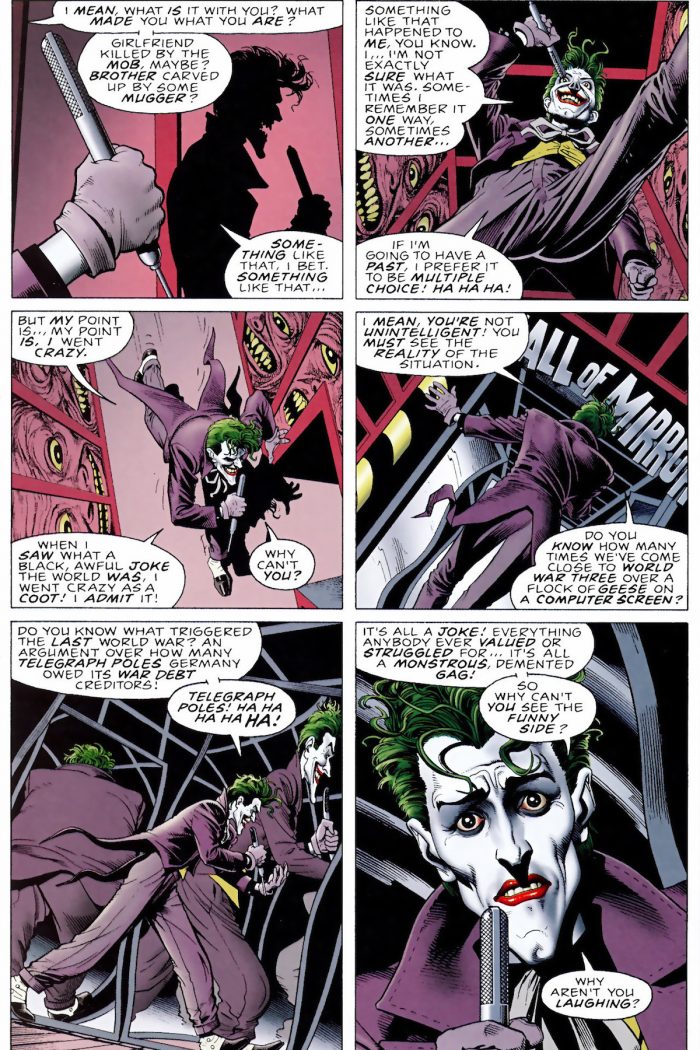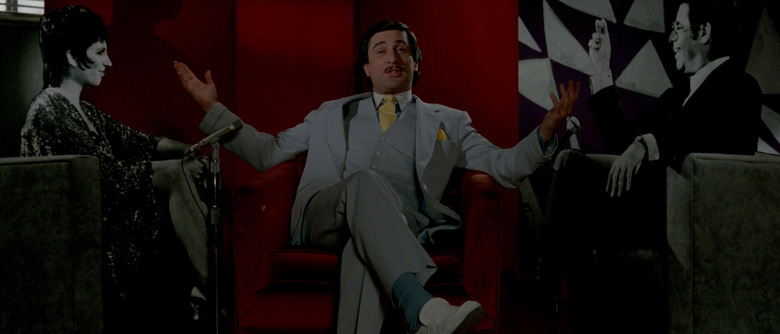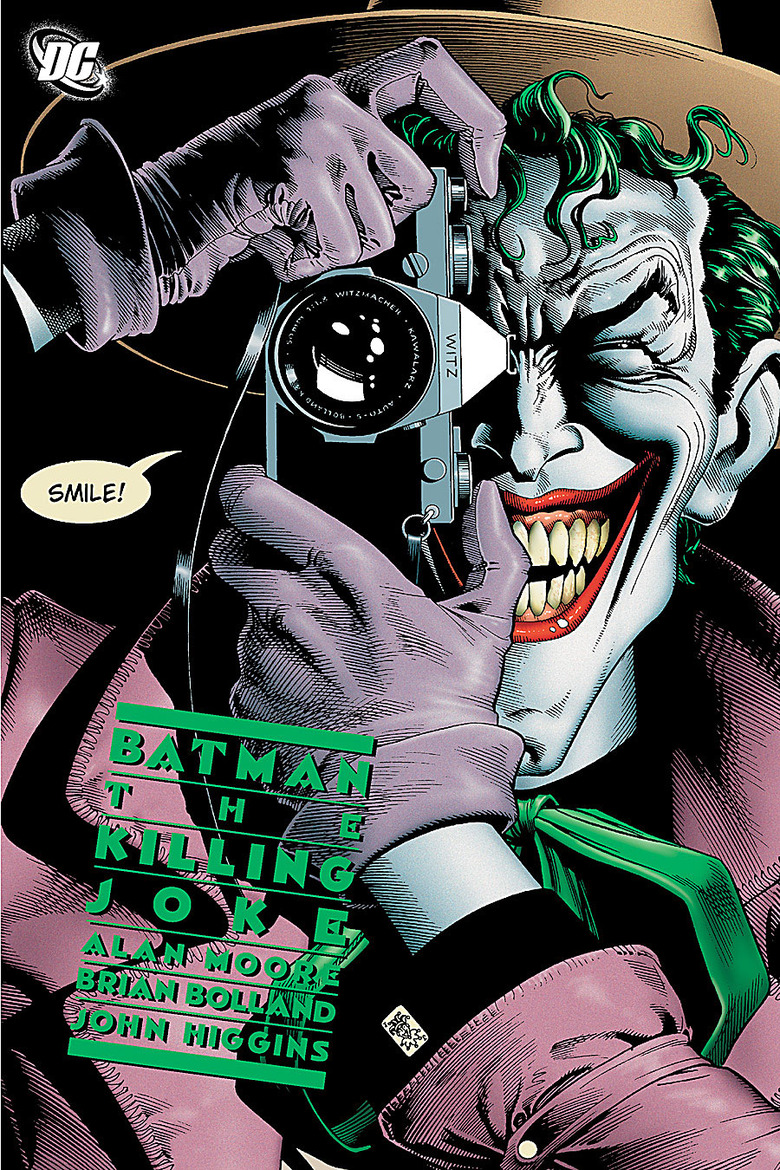How Martin Scorsese's 'The King Of Comedy' And DC Comics History Could Inform The Joker Origin Movie
We're still a year away from the release of Todd Phillips' Joker movie, an '80s-set origin film for the Clown Prince of Crime starring Joaquin Phoenix. As casting details trickle in, however, an early picture is beginning to form of what the movie might look like. One major hint of the perspective it could employ came with the recent news that the film will depict Batman's father, Thomas Wayne, as a "cheesy and tanned," Trump-esque '80s businessman.
Looking to The Art of the Deal book cover instead of the comic book page as a reference for Thomas Wayne would yield an irreverent take on the character, one we haven't seen before. Yet that take would be fully in line with a story grounded in the POV of a delusional, down-on-his-luck comedian who is resentful of the success of Gotham City's leading citizen. Joker (which is what we'll be calling this movie for now, as the official title has yet to be announced) looks to be going for this interpretation of the villain, drawing inspiration from Alan Moore and Brian Bolland's seminal 1988 graphic novel, Batman: The Killing Joke. The movie will also reportedly include nods to The King of Comedy, the undervalued 1982 Martin Scorsese gem about a wannabe comedian with delusions of grandeur.
The casting of Robert De Niro as a "talk show host who is somehow instrumental in the Joker's origin" (a reversal of his King of Comedy role) would only seem to cement The King of Comedy as an important touchstone for the Joker movie. Let's examine how Scorsese's film, combined with The Killing Joke and Phoenix's transformative ability, could renew the Joker's legend with an interesting portrayal on-screen.
The King of Comedy
While classics like Taxi Driver, Raging Bull, and Goodfellas have traditionally overshadowed The King of Comedy and labeled it as one of the lesser collaborations between Scorsese and De Niro, the film has undergone a significant reappraisal since its U.S. theatrical release back in 1983, when it was met with a muted reception. Maverick critics now regard it as Scorsese's finest film and in comedy, it holds its own reputation as a highly influential work. Let's first dig into this movie and then talk about how the troubled arc of its main character could tie back to the Joker movie, which Warner Bros. has described as an "exploration of a man disregarded by society [that] is not only a gritty character study, but also a broader cautionary tale."
The King of Comedy is a film that should be required viewing for anyone who aspires to be famous. It's a movie that shows an isolated dreamer who is so caught up in his own self-aggrandizing fantasy world that he is unable to merge his dreams with the flow of reality. The movie gets to the heart of the narcissism that makes a person like that tick.
De Niro's unreliable narrator, Rupert Pupkin, inhabits the lowest rung of a celebrity-obsessed culture. He's first shown staking himself outside the stage door of The Jerry Langford Show with a mob of screaming fans, some of whom clearly know him from the autograph-hunting circuit. A red-headed stalker named Masha, played by real-life stand-up comic Sandra Bernhard, registers as a peer to Rupert, yet it's clear from the way he interacts with her and others that Rupert has an inflated sense of worth.
His ambition is to be a comedian but instead of starting out small — playing nightclubs in New York, working his way up the showbiz ladder — he clings to the false hope of being an overnight success. When a producer's assistant reviews a tape Rupert has made of some of his material and tries to give him some earnest feedback, he doesn't want to listen. Unable to take stock of his true position, Rupert thinks the world owes him and the road to stardom will be quick and easy.
At first, it's rather pitiable to see this overgrown boy with a mustache play-acting in his room, which he has decorated like the set of his own personal talk show, complete with cardboard cutouts of guests like Liza Minnelli. The famous "You talkin' to me?" scene in Taxi Driver, where De Niro's other lonely, disturbed individual, Travis Bickle, practices his quick draw in front of the mirror, plays out in a more amusing version here, as Rupert lives with his mother and she is prone to interrupting him. Even with such reminders of the real world, however, he never quite fully comes back from the land of make-believe, because Rupert is someone whose fantasy life is, in fact, indistinguishable to him from reality.

Like Bickle, this makes him dangerous, unable to cope with the rude awakening he faces when reality inevitably comes crashing in. Rupert thinks the world revolves around him and when the dreamer in him finally becomes a doer, it does so in a way that twists the notion of achievement into something criminal. Kidnapping his idol and holding him at gunpoint, making the jaded talk show host, Langford, read ransom demands over the phone while he's duct-taped to a chair, Rupert forces his way on television, where he finally gets to deliver his stand-up monologue in front of a live studio audience during a taping of The Jerry Langford Show with guest host Tony Randall.
That Rupert actually manages to deliver a smooth set and get some laughs from the audience (presuming its response is real at this point and not just imagined) only makes his story that much crazier and sadder, because it suggests that if he had applied himself the right way — putting his head down and doing the grunt work of a club comic — he might have actually gotten somewhere without having to resort to a desperate scheme that would land him in jail. Rupert's parting quote before going off to jail is, "Better to be king for a night than a schmuck for a lifetime." So grotesque is the nature of the media that it seemingly rewards this man for his crime with the very fame he coveted.
Then again, who's to say that's what really happened at the end of the movie? In The King of Comedy, we see two different versions of Langford, played by comedy legend Jerry Lewis (with a sobriety that belies his slapstick fame). One Langford is real and the other exists solely in the mind of Rupert. Scenes in the film are edited together in such a way that the viewer is left gliding in and out of Rupert's fantasy sequences, with only Langford's overly complimentary, out-of-character behavior to indicate the surreal falsity of any given scene. By the end, there's no telling if what we are seeing is real or simply another product of Rupert's psychosis.
This is where the movie dovetails with what we know about Joker, its casting, and its title character's history. Think of Alec Baldwin's hammy Trump impersonation: the bad wig, the pursed lips, the orange spray-on tan. Now juxtapose that with the image of Thomas Wayne and imagine it being filtered through the Joker's warped perception of the world. De Niro's talk show host herein fills a role similar that of Langford; Marc Maron plays his booking agent, who functions as a liaison to guests à la the character of Cathy Long (Shelley Hack) in The King of Comedy. Meanwhile, the voice of Rupert's mother, which we only got to hear coming from off-screen in The King of Comedy, gets fleshed out into the character of Penny, the Joker's mother, played by Francis Conroy.
Having seen Lynne Ramsay's You Were Never Really Here this year, it's easy to imagine Phoenix playing another misfit who must care for his mother at home. It's also easy, having seen Zazie Beetz as Domino in Deadpool 2 this year, to imagine her acting as an unimpressed foil for a struggling stand-up comic, much like Diahnne Abbott's weary bartender does with Rupert in The King of Comedy. Beetz is set to play "a single mother who catches the eye of the man who will become" the Joker. Her character could also double as an analog to the Joker's pregnant wife in The Killing Joke.
DC Comics and Beyond
While some might feel that an unneeded origin tale demystifying Batman's greatest villain is a fundamentally bad idea, an approach mingling quasi-real fantasy with stark reality could make for an interesting, character-based Joker movie. This might help explain why an actor of Phoenix's caliber would be attracted to the project. Keep in mind: The Killing Joke is an origin tale, yet it's considered one of the definitive Joker stories and it's this benchmark comic that is providing the chief inspiration for Joker. Anyone who doubts whether the Joker can carry his own story, in which Batman is largely absent, would also be well-advised to check out Brian Azzarello and Lee Bermejo's 2008 graphic novel Joker.
Going the unreliable narrator route with the Joker — casting him in the mold of Rupert Pupkin whereby fantasy is seamlessly blended with reality — would still allow for a degree of ambiguity with the character. A film following this approach would not necessarily need to strip the Joker's background of all mystery. In The Killing Joke, the premise of the story, the thing the Joker sets out to prove by terrorizing Commissioner James Gordon, is that "All it takes is one bad day to reduce the sanest man alive to lunacy."
On the surface, what we see in the Joker's flashbacks are straightforward memories of a luckless loser who was pushed to the edge of sanity until he suffered a psychotic break. But would the Joker really be that lucid in his recollection of events? In the amusement park where he has his final confrontation with Batman, there's a part where the Joker is marching through a funhouse with a microphone, speaking to Batman over the P.A., talking about the buried trauma that helped form him before he completely snapped and took the "emergency exit" of madness. "Sometimes I remember it one way, sometimes another," he says. "If I'm going to have a past, I prefer it to be multiple choice!"
This calls into question the whole origin we see of him in the graphic novel, how he went from being a failed comedian to a sudden widower to a patsy for the Red Hood Gang. It's important to remember that The Killing Joke was originally meant to be a non-canonical one-shot, even though elements of it, like the controversial crippling and violation of Barbara Gordon, soon rippled across mainstream DC Comics continuity. Did the Joker's origin, as shown, even really happened or was it just a sympathetic backstory concocted by the insane clown as his brain got lost down some schizophrenic rabbit hole? The reader is left to decide.
It's not so different from the way we hear Heath Ledger's Joker relate conflicting versions of the story of how he got his scars. When Ledger was cast in The Dark Knight, there was a brief time when some fans scoffed at the notion of a young dramatic actor like him (or anyone) filling the shoes of Jack Nicholson. Who could ever top Nicholson's Joker? That's what people thought. Everyone quickly learned, however, that there was room for more than one interpretation of the Joker. He's such an iconic villain that he's been likened to a modern Shakespearean character, one whose mantle is as heavy as Hamlet's yet who different actors can portray across different mediums, be it television or film, animation or live-action.
The same periodic reinvention of the character has taken place in the comics, as well. In the Arkham Asylum graphic novel and Batman #663 ("The Clown at Midnight"), writer Grant Morrison used overwrought prose to give the Joker a new defining trait. He positioned the Joker as having a "kind of super-sanity" that saw him filling the empty vessel of his own personality with whichever attributes were most suitable based on the barrage of sensory input he was receiving from the outside world at any given time. Morrison's all-inclusive approach to Batman mythology thus enabled him to reconcile the Joker's multiple personalities — from harmless prankster to malicious murderer across the dizzy decades of comic book history — as instances of the Joker reinventing himself to suit the zeitgeist.
The same thing has happened in Hollywood over the years as the Joker has shifted from Cesar Romero's campy clown to Heath Ledger's pseudo-realistic "agent of chaos." In a media-saturated age where demagoguery has run rampant, it sounds like this newest version of the Joker that is in the works over at Warner Bros. could very well tap into the zeitgeist again, making a statement about the primacy of celebrity above sanity in the 21st century.
Jared Leto's Joker may understandably make people leery of the prospect of seeing another Joker so soon, but that's partly the fault of the movie he's in. Two summers removed from Suicide Squad, it still presents a fascinating case study in how a film's editing can eschew clarity in favor of cacophony, to the detriment of its characters. If you watched all the trailers and TV spots for Suicide Squad, then you would have already seen the bulk of Leto's performance.
The little we see or know of him comes mainly through flashbacks, fever-dream glimpses from the mind of Harley Quinn. These vignettes play like an audiovisual nightmare through her electroshocked brain ... which makes sense for her but doesn't give us a whole lot to go on, character-wise, for Mr. J. Otherwise, Leto's Joker is a thin collection of tattoos and teeth who seldom gets to breathe and even then seems prone to mere vamping through that shiny grill of his.
There's not much substance to him, but there had to be something of substance in the script for Joker that would pique Scorsese's interest in this project. Scorsese was previously attached to Joker as a producer, though Deadline reports that he is now no longer involved "as his dance card is full." Nonetheless, his influence is sure to be felt. The film is being directed by Todd Phillips, whose most recent effort, War Dogs, certainly aspired to be Scorsese-like—incorporating biographical voiceover and infusing the rise and fall of a criminal moneymaking empire with rock and pop songs, all while utilizing actors from past Scorsese films like Jonah Hill (The Wolf of Wall Street) and Kevin Pollack (Casino). Add "Scorsese homage" to the chameleonic presence of Joaquin Phoenix and Joker has the makings of something interesting.
Phoenix has reportedly lost a ton of weight to play the Joker, which makes him physically primed for a return to the raw, animalistic intensity of his performance in The Master. Like Ledger, he's an actor whose early filmography left him somewhat underestimated, even though he was being nominated for Oscars as far back as Gladiator and his scared reaction to a video in a darkened closet could almost single-handedly sell the realness of an alien invasion in Signs. Since doing his own singing in Walk the Line, growing out a beard and making his life a living art project in I'm Still Here, and staging a powerhouse comeback performance in The Master, Phoenix has established himself as one of the finest actors of his generation. His name is now regularly teamed with some of the best directors working today and if he saw something worth committing himself to in this project, that should earn it the benefit of the doubt.
In some ways, the creative instinct and the critical instinct are at cross-purposes. For movie news nerds, it's easy to get stuck in an armchair critic pose where we become slightly dismissive and reject new ideas at face value. Creative people have got to be more open-minded, less inclined to judge, lest they cut their own inspiration off at the knees. At the same time, what sounds good on paper isn't always a measure of surefire success. Drawing influence from The King of Comedy and The Killing Joke and employing an actor as highly respected as Phoenix, Joker at least has the benefit of the right raw ingredients. Time will tell whether it's able to parlay those ingredients into the right recipe on-screen.


